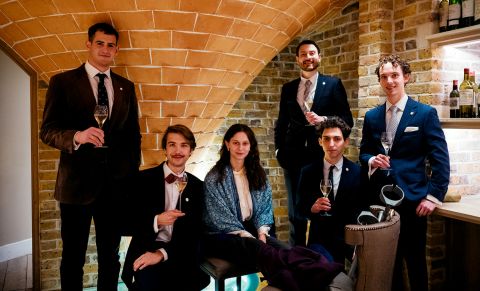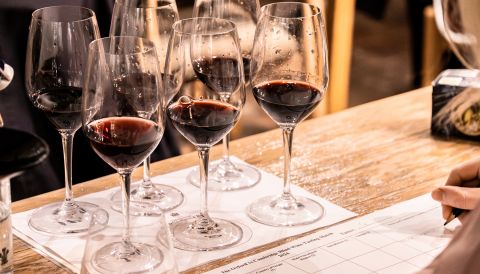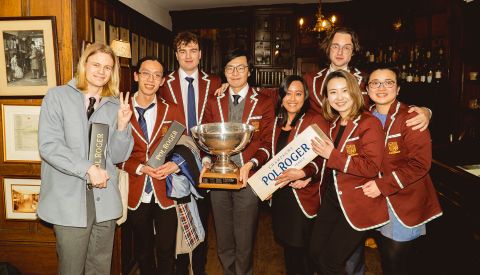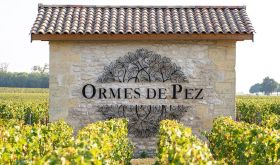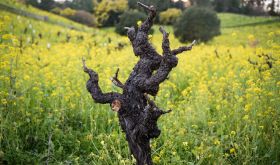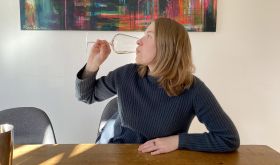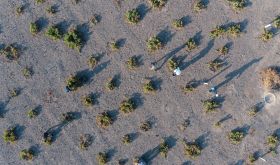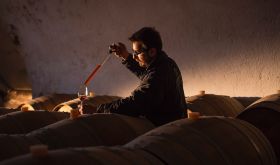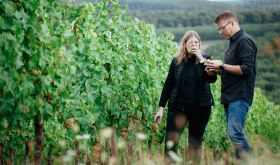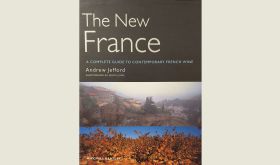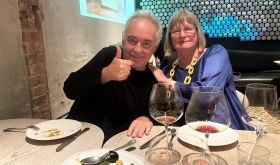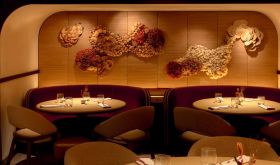Losing is never ideal, but as far as losing goes, the annual blind-tasting match between Oxford and Cambridge isn’t a bad competition to lose. I, along with the other members of Oxford’s blind-tasting team, learned this recently, when Cambridge (narrowly) won this year’s match, held on 22 February at the London premises of Berry Bros & Rudd.
Blind tasting is still fairly new for me. Although I was involved in a wine-tasting team in my final year of uni, most of my wine-drinking experience consists of sipping a glass of Riesling, Syrah or rosé while cooking or watching Netflix. Competitive blind tasting, however, is entirely different from drinking wine, I’ve discovered. It is a ruthlessly methodical process of stripping a mysterious liquid into its component parts – colour, acidity, sweetness, tannin, fruit condition, varietal characteristics and winemaking influences – and then deducing the wine’s predominant grape variety, country, region and subregion of origin, and vintage based on your assessment of those qualities.
I came to appreciate this process when I began trialling for Oxford’s blind-tasting team in January – a fairly intensive process that entailed attending practices held twice weekly and studying grape varieties, regions, winemaking and so on. These practices are usually led by a guest speaker, normally a member of the wine trade or a winery representative, or by our long-time coach: wine steward, wine writer and Oxford Companion to Wine contributor Dr Hanneke Wilson. Aside from providing general instruction on the art of blind tasting, the purpose of these practices is to prepare the team for its annual match against Cambridge.
This match, sponsored by Pol Roger and now in its 71st year, has long been a proving ground for future members of the British or international wine trade (you can read about Jancis’s experiences judging the competition here). As usual, it consisted of two flights of six wines apiece, selected by representatives from Pol Roger.
The first white was a dry-ish Vouvray, Vigneau-Chevreau’s Abbaye de Marmoutier Clos de Rougemont 2022. Although some of the tasters considered it ‘undistinguished’, I found its juicy apricot and peach notes fun (I thought it was either an Albariño or a Viognier with elevated acidity). The following wine, a 2020 Leeuwin Estate Art Series Riesling, was distinctly Australian, with its screaming acidity and sharp lime notes, though I placed it in Eden Valley rather than Margaret River. This succession of fairly dry, high-acid wines was interrupted by a botrytised sweet wine. The competitors were split between Tokaj (my choice) or Sauternes; it was in fact a 2005 Château Doisy-Daëne Barsac. This was followed by the hardest wine of the flight, a crisp, mineral Cusumano, Alta Mora 2021 Etna Bianco, which only one competitor – one of my teammates, I’m pleased to say – successfully identified. The final whites were Château Smith Haut Lafitte’s lush, tropical, Sauvignon Blanc-based second wine, Le Petit Haut Lafitte 2020, and a traditional, oxidatively made white Rioja: CVNE’s 2019 Monopole Clásico. White bordeaux is a style I often struggle with, but I found the Rioja easier to identify.
After a short break, we began the second flight and another 40 minutes of smelling, sipping, spitting and scribbling. The first wine was easily recognisable as a Pinot Noir, and most tasters successfully pinpointed it as coming from a relatively cool, New World region. I placed it in Central Otago, but it turned out to be a Fess Parker 2021 Sta Rita Hills Pinot Noir. Next in the line-up was a chocolatey 2017 Elephant Hill Syrah from Hawke’s Bay, which many of us found rather challenging; I was between a funky Malbec or Moulin-à-Vent. The third red was the most difficult of the competition: a brutally tannic, boozy (15.5% abv!) and bitter wine with quite a bit of VA to boot. Most of us successfully placed it in Italy (I thought it was a very extracted young Barolo), but no one pinpointed it as a Sagrantino from Montefalco, Arnaldo-Caprai’s 2019 Collepiano, to be exact. This force-of-nature of a wine was followed by a 2018 Tábula Ribera del Duero that many tasters found a bit nondescript, and then a rather enigmatic wine whose considerable age made it a challenge to identify. Most competitors placed it on Bordeaux’s left bank or in Rioja (my choice), and estimates of its age ranged from 2000 to the mid 2010s. It was in fact a 1988 Robert Mondavi Reserve Cabernet Sauvignon. The final wine was a light, charming 2021 St-Nicolas de Bourgueil.
After time was called, both teams retreated to a pub around the corner to restore our frayed nerves. This was followed by a reception at Berry Bros, where the judges, Sarah Jane Evans MW and Patrick Schmitt MW, announced the wines and winners. Cambridge’s talented team, which benefited from several very experienced tasters, outscored our team, which predominantly consisted of first-year competitors, on the whites and narrowly beat us on the reds. We reluctantly handed over the trophy that has gone back and forth between the two teams for years but, as I said, this isn’t a bad competition to lose. The bottle of non-vintage Pol Roger my teammates and I each received made for a pretty good consolation prize. For their part, the winning team all received bottles of Pol Roger 2016, and the top taster, Cambridge’s Victoria Phan, was awarded a jeroboam of vintage Pol (a great prize but I imagine it must have been challenging to lug such an unwieldy bottle around London for the rest of the day).
My team remained in good spirits for the rest of the day, perhaps thanks to the succession of wine, food and more wine that lasted until the early hours of the morning. Somewhere along the way several of my teammates proposed that I become president of the society next year, as our current president won’t be competing again. So Cambridge’s team has my heartfelt congratulations, but I, for one, am very much looking forward to winning back the trophy (and some vintage Pol) in next year’s competition.
As an intern, Julian Leidy administered our 2022 and 2023 wine writing competitions as well as the signed bookplate mailings for the new Oxford Companion to Wine for interested UK readers.


